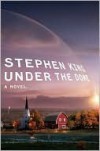3
Followers
22
Following
My Books and Me
I love reading. Which boils down to the fact I will read, to be honest, pretty much anything. I enjoy a wide range of genres, and prefer not to limit myself with preconceived notions about a book based on it’s genre. I do tend to gravitate towards fantasy a lot. I also find books with a political slant appealing, most particularly of the dystopian variety, but my interest is broader than that would suggest. I enjoy a lot of classics (well, who doesn’t – a book has to be pretty darn good to stand the test of time and remain popular with generation after generation of readers). I like historical fiction, contemporary fiction, sci fi, thrillers, mysteries, horror, children’s fiction, and even the occasional romance. Pretty much the only thing I actively avoid would be erotica.
Of course, that doesn’t mean I like every book I read ever. It just means I will give most books a chance. Sometimes this can cause a lot of frustration, because I can end up reading a lot of not-so-great books. Particularly with so much self-published material out there these days. There are some real gems out there, but sometimes you have to wade through a lot of detritus to find them. And even some of the rubbish contains much to redeem it, and I find myself wishing the author had had the benefit of a skilled editor, because there is so much promise there that failed to deliver.
I should make clear, I am no writer myself. I sometimes feel guilty judging the works of others harshly when it is still vastly superior to anything I could write. On the other hand, I think it does the author no favours to give false praise. I believe criticism is something we all learn from, and can lead us to better achievements. So when I review I try to err on the side of frank criticism where I feel it is warranted. This is not meant to offend, but inform. I may not be able to write fiction myself, but I am quite capable of assessing my own enjoyment of it – and that is what I intend to express.
Currently reading
Death Comes to Pemberley
The Ladies' Paradise (Les Rougon-Macquart, #11)
Under the Dome
Son of a Witch (Wicked Years, #2)
Anthem
 I’m actually finding it really difficult to express my thoughts about this novella. I think my biggest problem with it is that it seemed less like a well thought out story to me, and more like window dressing for her philosophy. It felt like blatant propaganda rather than something that was truly thought provoking.
I’m actually finding it really difficult to express my thoughts about this novella. I think my biggest problem with it is that it seemed less like a well thought out story to me, and more like window dressing for her philosophy. It felt like blatant propaganda rather than something that was truly thought provoking.Initially I quite liked the use of “we” and “us” instead of “I” and “me” to suggest the loss of individualism within society, but it quickly felt contradictory to me, since Equality 7-2521 (the central character and narrator) quite obviously had a clear sense of his own identity and of the individual identity of others, and that wasn’t altered by the use of different pronouns. It’s hard for me to explain, but it just felt to me that it was a narrative device that failed to do what it seemed like the author wanted it do do – a case of trying too hard, maybe. I don’t know. It’s just something that I thought was a good idea at first, but it just fell flat for me, and in the end was simply irritating.
There was also something about this story that rubbed me very much the wrong way as a feminist. In this society where everyone is supposed to be equal, and allocated to different houses according to how they serve society (ie their jobs), women are segregated from men and apparently excluded from the House of Scholars, for example. In fact the only women we encounter are working the fields, harvesting food. At first I had thought Rand had been clever in that there was no way to tell from the writing what gender anyone was, until it later became clear that the default was male, and women had their own special category. Which wouldn’t have been a problem, if that was something that was being criticised, but that’s not the case.
The only thing that is criticised is the concept of collectivism – the loss of individual rights and freedoms and one’s right to make choices. To be fair, Rand does a good job in that respect. However, I also think she oversimplifies the argument somewhat and presents us with a flawed premise to which she tells us she has the answer. I thinks it’s this last point, the tone of “you’re doing it wrong and I know best” that makes this feel like propaganda and not something I can take too seriously. I’m all for “what if” scenarios, no matter how far fetched, and I’m all for challenging established philosophies and politics and systems of government and what-have-you. I like to have my preconceptions challenged and to be given food for thought. Unfortunately Anthem doesn’t really come across that way to me. It felt like it was trying to tell me what to think, rather than asking me to question.
So, although I understand why some people consider this an important piece of writing, and I think Rand does raise some valid questions – I also think Anthem tries too hard to force its conclusions on me, and for that reason, above all others, I don’t really rate it highly at all. Am I glad I read it? Yes. But I won’t be doing so again.






